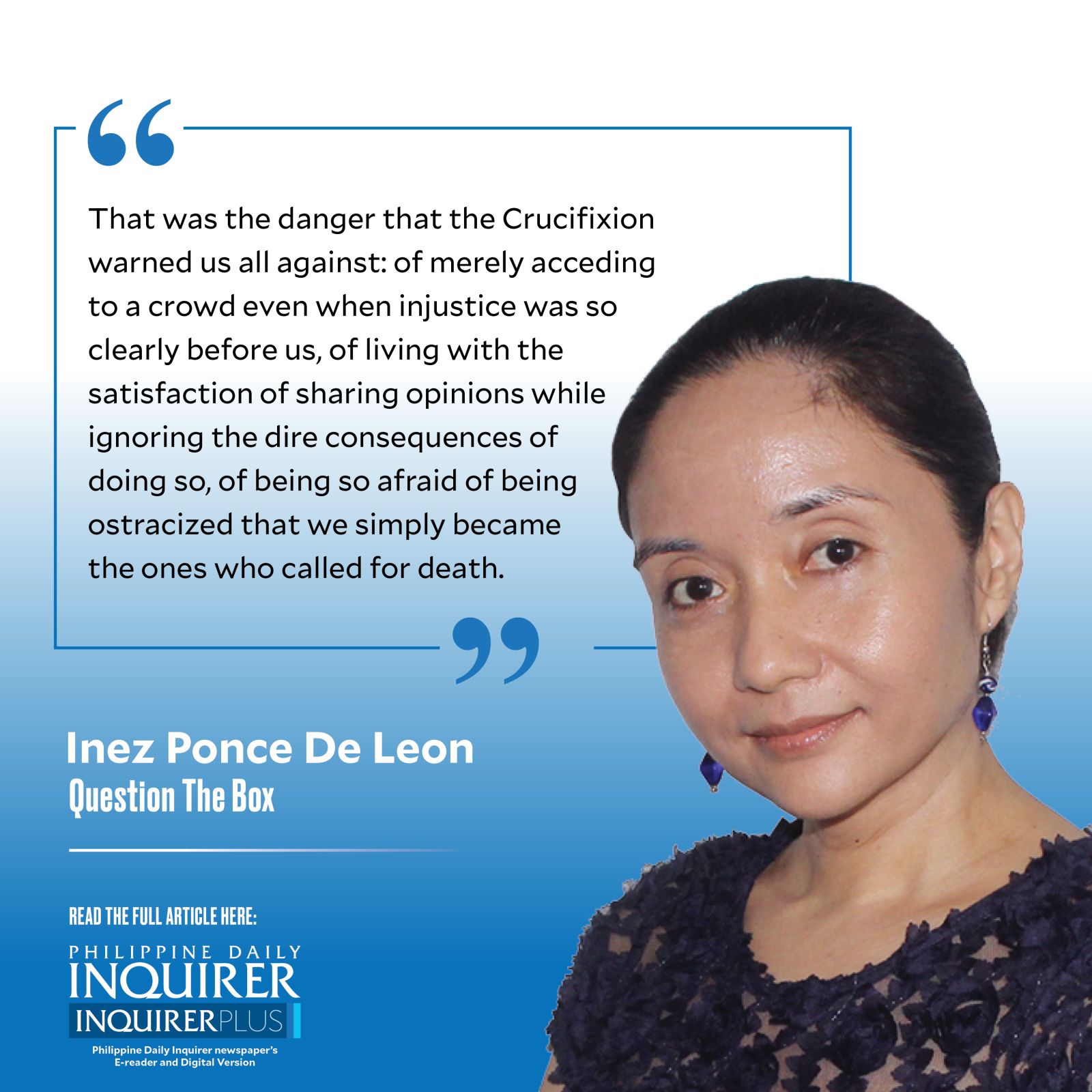The ones who called for death
I once wrote about the philosopher Hannah Arendt in the context of local elections. I will talk about her now, in closer context to Holy Week.
Arendt developed her work in 1930s Nazi Europe. She was arrested and briefly imprisoned because of her research into anti-Semitism. After her release, she fled Germany, settled in Paris, and, there, worked for a group that assisted young Jews as they were moved to Palestine. She even inventoried Jewish cultural assets that had been seized by the Nazis.
Article continues after this advertisementArendt was a vocal critic of the Nazi party, which, by then, thrived on propaganda that strove to convey the notion that Germany was defending itself from the Allied Forces which, they believed, were driven by the interests of the Jews. After the war, she still spoke fiercely about the evils of Nazism. She opposed the creation of a Jewish nation-state in Palestine, proposing a multiethnic federation instead. She also opposed leading philosophers at that time who would carelessly label anyone who did not agree with their views as anti-Semitic.
When Adolf Eichmann, the Schutzstaffel general, was tried in Israel, Arendt spoke of him as an example of the banality of evil. Banality doesn’t mean simple; it means that which is hidden in the most mundane. Real evil, in banal form, is that which can be enacted even by those who least look like monsters, who are normal and walk amongst us.
Evil, she later wrote, is not some radical idea, but one that arises from thoughtlessness, which, among many others, includes people simply obeying orders and adopting a popular opinion without thinking of what their conformity will lead to. It was a lack of empathy, therefore, and not simply an espousal of ideology or an outgrowth of ambition that led to the propagation of evil.
Article continues after this advertisementThe Nazis, Arendt said, deceived themselves to justify their actions, and to get out of the discomfort of being thoughtless. Some of them believed that their work was justified because it served to defend racial purity; others argued that the Jews were not really persons; others said that they were following orders and that even if they disobeyed, someone would see the orders through anyway. This self-deception—the complete denial of thought and reflection—was what sustained the evil.
Arendt was not without her critics, who could not stomach the idea that ordinary people could commit evil because they had no empathy, rather than because they had been indoctrinated into a way of thinking. Her argument, critics claimed, implied that the victims of injustice had a role in their oppression if they simply allowed themselves to be victimized and not fought back. She was accused, as well, of racism and anti-feminism, though she did concede in later years that her work had flaws that would allow for such an interpretation.
Arendt’s focus on the dangers of blind obedience, however, also led to a phrase that is attributed to her: No one has the right to obey.
This is a poor summary of what she said, which she had written as a reaction to another writer’s misinterpretation of Immanuel Kant’s moral philosophy. To Arendt, Kant’s work in this regard had to do “with man’s faculty of judgment, which rules out blind obedience.” To be human and moral, therefore, was to use one’s ability to judge with discernment and depth—rather than to simply make a decision out of compliance.
To Arendt, this hive mentality that sometimes clustered around potentially evil ideas, this buzzing of multitudes around burgeoning injustice—these showed that people did not always discern that which they followed. Instead, people were eager to follow rules and be part of a group, to obtain the satisfaction of being part of a community regardless of the message being espoused.
Such a maddened crowd, Arendt said, was thoughtless—not because it had stopped thinking, but because it had stopped reflecting, had refused to link actions to consequences, had ignored the complexity of an issue, and instead plunged into a decision.
These words come back this Holy Week, as we look at the Passion readings and relive the mysteries of the Easter Triduum. There, too, was a thoughtless crowd that called for the crucifixion of an innocent man—but there, too, have been many thoughtless crowds since.
These are the crowds of people that chant the name or slogans of a charismatic leader, mad with noise and bluster, directing the crowd’s emotions toward hatred of any group in society for which resentment might be planted. That madman can be in a suit or military dress; the crowd can be rich or poor, young or old. The people aren’t united only by a common enemy; they are united by a will to simply obey.
That was the danger that the Crucifixion warned us all against: of merely acceding to a crowd even when injustice was so clearly before us, of living with the satisfaction of sharing opinions while ignoring the dire consequences of doing so, of being so afraid of being ostracized that we simply became the ones who called for death.
——————
iponcedeleon@ateneo.edu

















